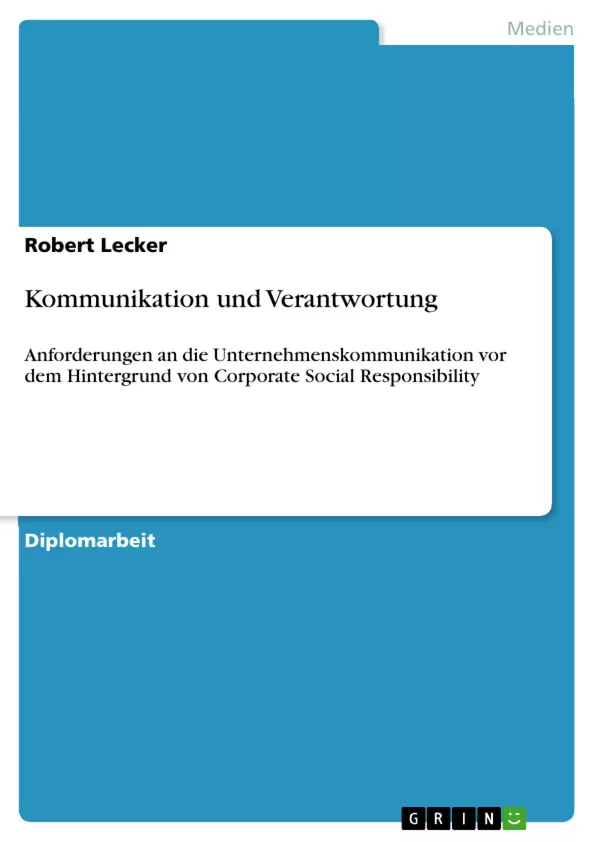Corporate Social Responsibility (CSR) ist nicht nur eines der bedeutendsten wirtschaftlichen und gesellschaftspolitischen Themen der Gegenwart, sondern auch eine der zentralen Herausforderungen an Unternehmenskommunikation und PR.
Das vorliegende Werk widmet sich dieser Themenkonstellation und liefert einen Beitrag zur Frage der Umsetzung von CSR aus der Perspektive der Unternehmenskommunikation. Es wird gezeigt, wo im CSR-Prozess professionelles Kommunikationsmanagement notwendig ist und wie CSR zur Erreichung von Kommunikationszielen beitragen kann. Darauf aufbauend wird eine Integration von Kommunikations- und CSR-Management herausgearbeitet. CSR ist hierbei weit mehr als nur ein zeitgeistiges PR-Tool: Kommunikation im Sinne des CSR-Gedankens verlangt nach speziellen Prinzipien und Anforderungen, denen sich die Unternehmenskommunikation stellen muss. Diese werden zuerst theoretisch herausgearbeitet, in Annahmen zusammengefasst und anhand einer Studie mit der Praxis kontrastiert.
Inhaltsverzeichnis
- EINLEITUNG
- 1 BEGRIFFSDEFINITIONEN UND AUSGANGSPOSITION
- 1.1 UNTERNEHMENSKOMMUNIKATION UND KOMMUNIKATIONSMANAGEMENT
- 1.1.1 Definition von Unternehmenskommunikation
- 1.1.2 Verwendung verschiedener Begriffe
- 1.1.3 Kommunikationsmanagement
- 1.2 DAS KONZEPT DER CORPORATE SOCIAL RESPONSIBILITY
- 1.2.1 Begriffswirrwarr und Abgrenzungen
- 1.2.2 Abgrenzung von CSR und Corporate Citizenship
- 1.2.3 Verwendung der Begriffe CSR, CSR-Management und Verantwortungsmanagement in dieser Arbeit
- 1.3 PROFESSIONALISIERUNG UND INSTITUTIONALISIERUNG ALS GROßE HERAUSFORDERUNGEN FÜR DAS VERANTWORTUNGSMANAGEMENT
- 2 ZUM VERHÄLTNIS VON CSR UND UNTERNEHMENSKOMMUNIKATION
- 2.1 KOMMUNIKATIONSMANAGEMENT IM CSR-PROZESS
- 2.1.1 Stakeholder- und Issues Management
- 2.1.2 Corporate Identity (CI), Unternehmenskultur und Wertemanagement
- 2.1.3 Interne Kommunikation
- 2.1.4 Externe Kommunikation
- 2.2 CSR ALS ERFOLGSPOTENTIAL DES KOMMUNIKATIONSMANAGEMENTS
- 2.2.1 Verantwortung erhöht Reputation, Vertrauen und Glaubwürdigkeit: Grundbedingungen und Ziel erfolgreicher Unternehmenskommunikation
- 2.2.2 Kommunikative Erfolgspotentiale in verschiedenen Handlungsfeldern der Unternehmenskommunikation
- 2.3 INTEGRATION VON VERANTWORTUNGS- UND KOMMUNIKATIONSMANAGEMENT
- 3 ANFORDERUNGEN AN DIE UNTERNEHMENSKOMMUNIKATION
- 3.1 PRINZIPIEN VERANTWORTUNGSVOLLER UNTERNEHMENSKOMMUNIKATION
- 3.1.1 Unternehmenskommunikation als dialogische Kommunikation
- 3.1.2 Unternehmenskommunikation als transparente Kommunikation
- 3.1.3 Unternehmenskommunikation als authentische und glaubwürdige Kommunikation
- 3.1.4 Unternehmenskommunikation als zurückhaltende Kommunikation
- 3.1.5 Unternehmenskommunikation als langfristige und strategische Kommunikation
- 3.1.6 Unternehmenskommunikation als vermittelnde Kommunikation
- 3.2 KOMPETENZBEREICHE UND WissensFELDER
- 3.2.1 Verantwortungsmanagement als Querschnittsmanagement
- 3.2.2 Verantwortungsmanagement als Projektmanagement
- 3.2.3 Verantwortungsmanagement als Wissensfeld
- 3.3 ANFORDERUNGEN AN KOMMUNIKATIONSMANAGERINNEN
- 3.3.1 Fachkompetenz
- 3.3.2 Realisationskompetenz
- 3.3.3 Sachkompetenz
- 3.3.4 Soziale Orientierung
- 3.3.5 Fazit: die Herausforderung einer adäquaten Ausbildung
- 3.4 ZUSAMMENFASSUNG: 12 ANNAHMEN ZUR SKIZZIERUNG DER ANFORDERUNGEN AN DIE UNTERNEHMENSKOMMUNIKATION VOR DEM HINTERGRUND VON CSR
- 4 EMPIRISCHER TEIL: METHODIK UND VORGEHENSWEISE
- 4.1 DIE BEFRAGUNGSMETHODE: EXPERTENINTERVIEW
- 4.1.1 Experteninterview als offenes Leitfadeninterview
- 4.2 FRAGESTELLUNG UND LEITFADEN
- 4.2.1 Gliederung des Leitfadens
- 4.3 ABLAUF DER BEFRAGUNG
- 4.3.1 Auswahl der Untersuchungspersonen
- 4.3.2 Anbahnung des Interviews
- 4.3.3 Durchführung der Interviews
- 4.4 AUSWERTUNG
- 4.4.1 Transkription
- 4.4.2 Paraphrase
- 4.4.3 Überschriften
- 4.4.4 Thematischer Vergleich
- 4.4.5 Konzeptualisierung und theoretische Generalisierung
- 5 DARSTELLUNG DER FORSCHUNGSERGEBNISSE
- 5.1 VERHÄLTNIS CSR UND UNTERNEHMENSKOMMUNIKATION
- 5.1.1 Verhältnis CSR und Unternehmenskommunikation in der Praxis
- 5.2 KOMMUNIKATION ALS VERANTWORTUNSDIMENSION
- 5.2.1 Kommunikation als Verantwortungsdimension: Kompetenzanforderungen an Kommunikationsmanagerinnen
- 5.3 UNTERNEHMENSKOMMUNIKATION ALS DIALOGISCHE KOMMUNIKATION
- 5.3.1 Dialogische Kommunikation in der Praxis
- 5.4 UNTERNEHMENSKOMMUNIKATION ALS TRANSPARENTE, AUTHENTISCHE UND GLAUBWÜRDIGE KOMMUNIKATION
- 5.4.1 Transparenz und Authentizität in der Praxis
- 5.5 UNTERNEHMENSKOMMUNIKATION ALS ZURÜCKHALTENDE KOMMUNIKATION
- 5.5.1 Zurückhaltende Kommunikation in der Praxis
- 5.6 UNTERNEHMENSKOMMUNIKATION ALS LANGFRISTIGE UND STRATEGISCHE KOMMUNIKATION
- 5.6.1 Langfristige und strategische Kommunikation in der Praxis
- 5.7 UNTERNEHMENSKOMMUNIKATION ALS VERMITTELNDE KOMMUNIKATION
- 5.8 VERANTWORTUNGSMANAGEMENT ALS QUERSCHNITTSMANAGEMENT
- 5.8.1 Verantwortungsmanagement als Querschnittsmanagement: Kompetenzanforderungen an Kommunikationsmanagerinnen
- 5.9 VERANTWORTUNGSMANAGEMENT ALS PROJEKTMANAGEMENT
- 5.10 VERANTWORTUNGSMANAGEMENT ALS WISSENSFELD
- 6 ZUSAMMENFASSUNG DER ERGEBNISSE
- 6.1 FAZIT, REFLEXION UND PERSÖNLICHE ANSICHTEN ZUM FORSCHUNGSGEGENSTAND
Zielsetzung und Themenschwerpunkte
Diese Diplomarbeit befasst sich mit den Anforderungen an die Unternehmenskommunikation vor dem Hintergrund von Corporate Social Responsibility (CSR). Sie analysiert, wie Unternehmenskommunikation in die Praxis von CSR integriert werden kann, um so das Erfolgspotential von CSR zu erhöhen und die Reputation, das Vertrauen und die Glaubwürdigkeit des Unternehmens zu stärken.
- Definition von Unternehmenskommunikation und CSR sowie deren Verhältnis zueinander
- Analyse der kommunikativen Erfolgspotentiale von CSR in verschiedenen Handlungsfeldern der Unternehmenskommunikation
- Herausarbeitung der Prinzipien verantwortungsvoller Unternehmenskommunikation
- Definition der Kompetenzbereiche und Wissensfelder, die für Kommunikationsmanagerinnen im Bereich CSR relevant sind
- Empirische Untersuchung der Anforderungen an die Unternehmenskommunikation im Kontext von CSR anhand von Experteninterviews
Zusammenfassung der Kapitel
Die Arbeit beginnt mit einer Definition von Unternehmenskommunikation und CSR, um die Ausgangspunkte für die Analyse zu klären. Anschließend wird das Verhältnis zwischen CSR und Unternehmenskommunikation untersucht und die Bedeutung von Kommunikation im CSR-Prozess aufgezeigt. Dabei werden verschiedene Handlungsfelder der Unternehmenskommunikation betrachtet und deren spezifische Herausforderungen im Kontext von CSR beleuchtet.
Die Arbeit setzt sich mit den Prinzipien verantwortungsvoller Unternehmenskommunikation auseinander und zeigt auf, wie Unternehmen durch eine dialogische, transparente, authentische, zurückhaltende, langfristige und vermittelnde Kommunikation Verantwortung übernehmen können. Darüber hinaus werden die relevanten Kompetenzbereiche und Wissensfelder für Kommunikationsmanagerinnen im Bereich CSR erörtert.
Im empirischen Teil werden die Ergebnisse von Experteninterviews präsentiert, die Aufschluss über die Anforderungen an die Unternehmenskommunikation im Kontext von CSR aus Sicht von Praxisakteuren geben. Die Arbeit schließt mit einer Zusammenfassung der Ergebnisse und einer Reflexion über die Bedeutung von CSR für die Unternehmenskommunikation.
Schlüsselwörter
Unternehmenskommunikation, Corporate Social Responsibility (CSR), Kommunikation, Verantwortung, Stakeholder-Kommunikation, Dialog, Transparenz, Authentizität, Glaubwürdigkeit, Reputation, Vertrauen, Kompetenz, Kommunikationsmanagerinnen, Experteninterview, Praxisforschung.
- Quote paper
- Robert Lecker (Author), 2009, Kommunikation und Verantwortung, Munich, GRIN Verlag, https://www.grin.com/document/190157




